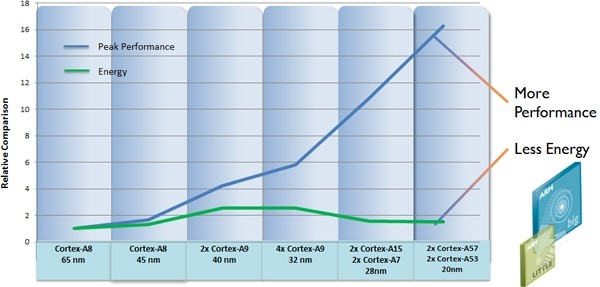Yesterday it was revealed that AMD was planning to build 64-bit ARM-based processors for server use. They won’t arrive until sometime in 2014 and quite frankly, we didn’t have much information about the ARM chips in question. That’s all changed today as ARM unveiled the Cortex-A50 Series consisting of two new 64-bit core designs.
The flagship design is the Cortex-A57 which is expected to be up to three times faster than chips found in the latest generation of smartphones. This of course will all be possible using the same power budget as currently-available chips. The Cortex-A53, on the other hand, will be able to deliver the same smartphone experience possible today using only a quarter of the power.

Both designs will use ARM’s 64-bit ARMv8 architecture which will make the Cortex-A53 the world’s smallest 64-bit processor. The duo are also fully backwards compatible with 32-bit applications and can even work together in a configuration that ARM calls big.LITTLE.
In this configuration, the two chips can work together with the efficient Cortex-A53 handling basic tasks. If more power is needed, the beefier Cortex-A57 springs to life, picking up where the A53 left off.
Unfortunately just because ARM announced the two designs doesn’t mean we will see them anytime soon. If you weren’t already aware, ARM doesn’t actually build physical processors; they simply design the intellectual property that’s then licensed out to chip makers like AMD and Samsung. It’s up to these companies to complete the rest of the design and build the chips.
Judging by AMD’s server chip announcement and how long it’s taken chip makers to deliver on other designs, we’ll likely start to see 64-bit ARM chips show up in handsets sometime in 2014.
https://www.techspot.com/news/50656-arm-announces-64-bit-cortex-a57-and-cortex-a53-processors.html